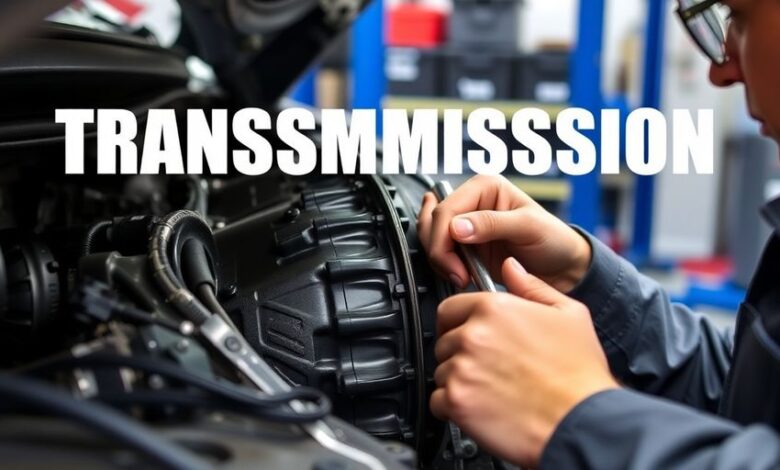
Finding a reliable transmission shop near me can feel overwhelming, especially if you’re not familiar with what to look for. Your vehicle’s transmission is crucial for its performance, so you want to make sure you’re getting quality service. In this guide, we’ll break down the steps to find the best transmission shop, what to consider when choosing one, and the services you can expect. Let’s get started!
Key Takeaways
- Use online tools to find local transmission shops and read customer reviews.
- Look for shops with a solid reputation and good customer feedback.
- Consider the experience and specialization of the technicians.
- Check if the shop offers warranties on their services and parts.
- Don’t forget to assess the shop’s customer service and communication.
How To Search For The Best Transmission Shop Near Me
Finding a reliable transmission shop doesn’t have to be a headache. I remember when my car started acting up – the gears were slipping, and it made this awful grinding noise. I knew it was time to find a good shop, but where to start? Here’s what I learned about finding the best transmission shop in your area.
Utilize Online Search Engines
The first thing I did was hop online and start searching. I used search engines like Google and also checked out online directories like Yelp. Typing in “transmission shops near me” brought up a bunch of options. It’s a good way to get a quick overview of what’s available. I found that some shops even had special offers or discounts listed online, which was a nice bonus. Don’t just look at the first few results; scroll through and see what catches your eye. You can also use online search engines to find ASE certified professionals for car transmission solutions.
Explore Local Directories
Don’t underestimate the power of local directories! I checked out a few, like the Yellow Pages online, and found some hidden gems that didn’t pop up in my initial search engine results. These directories often have listings for smaller, family-owned shops that might not have a huge online presence but still offer great service. Plus, they sometimes include customer reviews, which can be super helpful. It’s like finding a local secret!
Read Customer Reviews
Okay, this is crucial. Before even thinking about taking my car to a shop, I spent a good chunk of time reading customer reviews. I looked at Google Reviews, Yelp, and even the Better Business Bureau website. Pay attention to what people are saying about the shop’s communication, the quality of their work, and whether they stand behind their repairs. A few negative reviews are normal, but if you see a pattern of complaints, that’s a red flag. I also found it helpful to look for reviews that mentioned specific transmission issues similar to mine – it gave me a better sense of whether the shop had experience with my type of problem.
Reading reviews can save you from a lot of potential headaches. Look for shops with consistently positive feedback and a good track record of customer satisfaction. It’s worth the time to do your research and find a shop that you can trust.
Key Factors To Consider When Choosing A Transmission Shop

Okay, so your transmission is acting up, and you need to find a shop. It can feel overwhelming, but don’t sweat it. Here’s what I always keep in mind when I’m looking for a good transmission shop. It’s not just about the closest place; it’s about finding someone you can trust with your car.
Reputation and Customer Feedback
First things first, what are other people saying? Online reviews are your friend. I usually check Google, Yelp, and even the Better Business Bureau. You’re looking for patterns. Does the shop consistently get good reviews? Are there a lot of complaints about the same thing? A few bad reviews are normal, but a pattern of issues is a red flag. You want to find a shop with a solid reputation for doing good work and treating customers fairly. It’s also worth asking around. Word-of-mouth can be super helpful. Ask your friends, family, or coworkers if they have any recommendations.
Experience and Specialization
I always try to find a shop that specializes in transmissions. General auto repair shops are fine for some things, but transmissions are complicated. You want someone who knows transmissions inside and out. Look for shops that have been around for a while and have certified technicians. Experience matters. The more experience a shop has, the more likely they are to have seen your type of problem before and know how to fix it.
Warranty and Service Guarantees
This is a big one. A good shop should stand behind its work. Make sure they offer a warranty on their repairs. The warranty should cover both parts and labor. Read the fine print, so you know what’s covered and for how long. A warranty gives you peace of mind knowing that if something goes wrong after the repair, you’re covered. It also shows that the shop is confident in the quality of its work. Don’t be afraid to ask about transmission repair warranties before committing to anything.
Finding a reliable transmission shop is like finding a good doctor. You want someone who is knowledgeable, experienced, and trustworthy. Take your time, do your research, and don’t be afraid to ask questions. It’s worth the effort to find a shop that will do the job right and treat you fairly.
Services Offered By Quality Transmission Shops
When your car’s transmission starts acting up, knowing what services a good shop should offer can save you a lot of headaches (and money!). It’s not just about fixing what’s broken; it’s about preventing future problems too. Here’s a breakdown of what to expect:
Comprehensive Diagnostics
A top-notch transmission shop will start with a thorough diagnostic process. They don’t just guess; they use specialized equipment to pinpoint the exact cause of the issue. This might involve computer scans, fluid checks, and even test drives to get a complete picture of what’s going on inside your transmission. This is way more involved than just reading a code; it’s about understanding the whole system.
Fluid Services and Maintenance
Transmission fluid is the lifeblood of your transmission. Quality shops offer a range of fluid services, including:
- Fluid flushes: Completely replacing the old fluid with new, clean fluid.
- Fluid top-offs: Adding fluid to the correct level if it’s low.
- Filter changes: Replacing the transmission filter to keep the fluid clean.
- Inspections: Checking the fluid for signs of contamination or wear.
Regular fluid maintenance is key to extending the life of your transmission. Neglecting this can lead to serious problems down the road.
Repairs and Rebuilds
Of course, repairs are a big part of what transmission shops do. This can range from simple fixes like replacing a sensor to more complex jobs like:
- Replacing worn clutches or bands
- Repairing or replacing valve bodies
- Fixing leaks
- Rebuilding the entire transmission
In some cases, a complete rebuild might be the best option. This involves disassembling the transmission, cleaning and inspecting all the parts, replacing any worn or damaged components, and then reassembling it. It’s a big job, but it can save you money in the long run compared to replacing the whole transmission.
Benefits of Choosing a Specialized Transmission Shop
Many general auto repair shops do offer transmission services, but specialized transmission shops come with some real advantages. It’s like going to a heart doctor versus your family doctor when you have a heart problem – the specialist just knows more.
Advanced Diagnostic Tools
Specialized shops use state-of-the-art diagnostic equipment to really pinpoint transmission issues. These tools allow mechanics to diagnose problems without unnecessary guesswork, saving time and ensuring accurate repairs. Think of it like this: a general mechanic might see a symptom and guess at the cause, but a specialist can use advanced tools to see exactly what’s going on inside your transmission. electrical diagnostics are key.
Expert Technicians
Transmission specialists undergo specific training to handle both automatic and manual transmissions efficiently. Unlike general mechanics, these experts receive in-depth education on modern transmission systems, including CVT and dual-clutch transmissions. They stay updated on evolving industry trends, ensuring they can repair the latest transmission models.
Access to Quality Parts
Dedicated shops have access to high-quality transmission components, ensuring durability and performance. Unlike general repair centers that may use aftermarket parts of questionable quality, specialized shops source genuine or OEM-approved transmission components. Using high-quality parts ensures optimal performance, extending the lifespan of your vehicle’s transmission.
Choosing a specialized transmission shop is about more than just getting your car fixed. It’s about getting it fixed right, with the right tools, the right parts, and the right people. It’s an investment in the long-term health of your vehicle.
Here’s a quick rundown of what you can expect:
- Better diagnostic accuracy
- Faster repair times
- Fewer repeat visits for the same problem
Understanding Transmission Repair Processes

Types of Transmission Repairs
Transmission repairs can range from simple fixes to complete overhauls. It’s not always a one-size-fits-all situation. You might be looking at a minor adjustment, or you could need a full transmission rebuild. Here’s a quick rundown:
- Minor Repairs: These address small issues like leaks, sensor replacements, or adjustments. They’re usually less expensive and quicker to complete.
- Major Repairs: This involves replacing damaged internal components, such as gears, clutches, or seals. It’s more involved than a minor repair but less extensive than a rebuild.
- Transmission Rebuilds: A rebuild means disassembling the entire transmission, cleaning and inspecting all parts, replacing worn or damaged components, and then reassembling it. This is a comprehensive solution and often comes with a warranty.
- Transmission Replacement: In some cases, the damage is too severe, and a replacement is the only option. This involves removing the old transmission and installing a new or remanufactured one.
Signs Your Transmission Needs Attention
Knowing when to take your car in can save you a lot of money and hassle. Ignoring the warning signs can lead to bigger, more expensive problems down the road. Here are some common indicators that your transmission might need attention:
- Slipping Gears: The engine revs up, but the car doesn’t accelerate properly.
- Rough Shifting: Shifts feel jerky or delayed.
- Unusual Noises: Whining, clunking, or humming sounds coming from the transmission.
- Burning Smell: This could indicate overheating or a fluid leak.
- Check Engine Light: While it could be something else, a check engine light can signal a transmission issue.
It’s always best to get a professional diagnosis if you suspect a problem. Early detection can prevent further damage and potentially save you from needing a complete transmission replacement.
Cost Considerations for Repairs
The cost of transmission repair can vary widely depending on the type of repair needed, the make and model of your vehicle, and the shop you choose. It’s a good idea to get estimates from several shops before making a decision. Here are some factors that influence the cost:
- Type of Repair: Minor repairs will be less expensive than major repairs, rebuilds, or replacements.
- Parts: The cost of replacement parts can vary depending on the quality and availability.
- Labor: Labor costs will depend on the shop’s hourly rate and the complexity of the job.
- Warranty: A longer warranty may increase the cost but can provide peace of mind.
| Repair Type | Estimated Cost Range | Description of course, it’s always a good idea to get a transmission serviceregularly to keep things running smoothly.
The Importance of Customer Service in Transmission Shops
Customer service can make or break your experience at a transmission shop. It’s not just about fixing your car; it’s about how you’re treated during the process. A shop with great customer service will keep you informed, answer your questions, and make sure you feel comfortable with the repairs being done. Let’s face it, transmission problems are stressful enough, so a little bit of good service can go a long way.
Clear Communication
Clear communication is super important. You want a shop that explains what’s wrong in a way you can understand, without using a bunch of technical jargon. They should keep you updated on the progress of the repairs and let you know if any unexpected issues come up. It’s all about keeping you in the loop so you don’t feel like you’re in the dark.
Transparency in Pricing
No one likes hidden fees or surprise charges. A good transmission shop will give you a detailed estimate upfront, explaining exactly what you’re paying for. They should be transparent about their pricing and willing to answer any questions you have about the cost of repairs. If they can’t explain why something costs what it does, that’s a red flag.
Post-Repair Support
Customer service doesn’t end when you drive your car off the lot. A reputable shop will offer post-repair support, meaning they’re available to answer questions or address any concerns you have after the work is done.
It’s nice to know that if something goes wrong or you just have a question, you can call them up and they’ll be there to help. This kind of support shows they stand behind their work and care about your satisfaction.
Here’s a quick list of what to expect:
- Follow-up calls to check on your satisfaction
- Warranties on parts and labor
- Easy access to service records
How to Verify the Credibility of a Transmission Shop
It’s super important to make sure the transmission shop you pick is actually legit. You don’t want to end up with shoddy work or get ripped off. Here’s how to do some digging and make sure they’re on the up-and-up.
Check Certifications and Accreditations
Okay, so first things first, look for certifications. Shops that have certifications from places like the Automotive Service Excellence (ASE) or the Automatic Transmission Rebuilders Association (ATRA) have met certain standards. This means their technicians have been tested and proven to know their stuff. It’s like a stamp of approval saying they’re not just winging it. These certifications show a commitment to quality and ongoing training, which is always a good sign.
Look for Industry Affiliations
Beyond certifications, see if the shop is affiliated with any industry organizations. Being part of a professional group often means they’re serious about staying up-to-date with the latest tech and best practices. It also suggests they’re committed to ethical business practices. Think of it as belonging to a club where everyone is dedicated to doing things the right way. It’s a good way to find a reputable shop.
Assess Shop Cleanliness and Organization
Don’t underestimate the power of a clean and organized shop! A messy shop can be a sign of sloppy work. If the place looks like a disaster zone, it might reflect how they treat your car. A well-organized shop usually means they pay attention to detail and take pride in their work. Plus, it’s just a more pleasant experience for you.
A clean and organized shop is a good indicator of the quality of service you can expect. It shows attention to detail and a commitment to professionalism, which are important when dealing with complex transmission repairs.
Here’s a quick checklist:
- Is the waiting area tidy?
- Are the tools and equipment properly stored?
- Does the shop look generally well-maintained?
Wrapping It Up: Your Path to Quality Transmission Repairs
So, there you have it. Finding a good transmission shop doesn’t have to be a headache. Just take your time, do some homework, and don’t be afraid to ask around. Look for places with solid reviews and a good reputation. Remember, it’s all about getting your car back on the road safely and smoothly. Whether you need a quick fix or a major overhaul, the right shop can make all the difference. Trust your gut, and don’t settle for less. Happy driving!
Frequently Asked Questions
How can I find a good transmission shop near me?
You can search online using Google or local directories, read customer reviews, and ask friends for recommendations.
What should I look for in a transmission repair shop?
Check their reputation, read customer feedback, see how much experience they have, and ask about warranties on their work.
What services do transmission shops usually offer?
Most shops provide diagnostics, fluid services, repairs, and even rebuilds for transmissions.
Why is it important to choose a specialized transmission shop?
Specialized shops have expert technicians, advanced tools, and access to high-quality parts, ensuring better repairs.
What are common signs that my transmission needs repair?
Signs include strange noises, slipping gears, warning lights on your dashboard, or leaking fluid.
How much should I expect to pay for transmission repairs?
Costs can vary widely based on the type of repair needed, so it’s best to get estimates from different shops.



